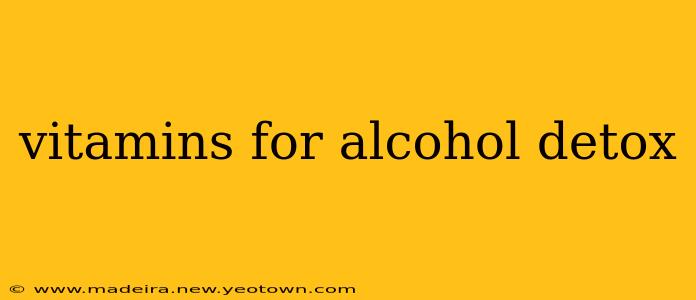The decision to quit alcohol is a significant step towards better health, and it's crucial to understand that recovery is a multifaceted process. While willpower is essential, your body needs nutritional support to navigate the challenges of alcohol withdrawal. This isn't about a magic pill; it's about providing the building blocks your body needs to repair itself after prolonged alcohol abuse. Think of it as giving your body the tools to rebuild after a period of neglect. This article explores the key vitamins often recommended during alcohol detox and how they contribute to a healthier recovery. Remember, always consult a doctor or healthcare professional before starting any new supplements, especially during detox. They can provide personalized guidance based on your specific needs and medical history.
What Vitamins Are Depleted During Alcohol Abuse?
Alcohol interferes with the body's ability to absorb and utilize essential nutrients. This leads to deficiencies in several vital vitamins and minerals, which can exacerbate withdrawal symptoms and hinder recovery. Some of the most commonly affected include B vitamins, vitamin C, and vitamin D. This isn't merely a case of mild discomfort; these deficiencies can lead to serious health complications. Let's delve deeper into the roles of these key players.
B Vitamins: The Unsung Heroes of Detox
The B vitamin family (B1, B2, B3, B6, B9, and B12) plays a crucial role in energy production, nerve function, and red blood cell formation. Alcohol interferes with their absorption and can lead to significant deficiencies. A deficiency can manifest in various ways, including fatigue, nerve damage (peripheral neuropathy), and anemia. During detox, B vitamins become incredibly important for supporting the body's metabolic processes and restoring normal function.
Vitamin C: The Antioxidant Ally
Vitamin C is a powerful antioxidant, protecting cells from damage caused by free radicals. Alcohol consumption increases oxidative stress, and a vitamin C deficiency can worsen this damage. Adequate vitamin C intake helps support the immune system, crucial during the vulnerable period of detox.
Vitamin D: Beyond Bone Health
Vitamin D is often overlooked, but it plays a crucial role in immune function, mood regulation, and calcium absorption. Alcohol can disrupt vitamin D metabolism, leading to deficiency. During alcohol detox, sufficient vitamin D can help support mood stability and overall well-being, potentially easing some withdrawal symptoms.
What Other Nutrients Are Important During Alcohol Detox?
Beyond vitamins, other nutrients are crucial for supporting recovery from alcohol abuse. These include:
- Magnesium: Essential for nerve function and muscle relaxation, often depleted in individuals with alcohol dependence.
- Zinc: Important for immune function and wound healing.
- Potassium: Helps maintain electrolyte balance, which can be disrupted by alcohol.
Can I Get These Nutrients Through Diet Alone?
While a healthy, balanced diet is always the ideal starting point, it can be challenging to achieve sufficient nutrient levels solely through food during alcohol detox. The body's ability to absorb and utilize nutrients is often compromised after prolonged alcohol abuse. Supplementation can help bridge the gap and ensure the body receives the support it needs to heal. Always consult a healthcare professional to determine if supplementation is necessary and to discuss appropriate dosages.
Are There Any Risks Associated with Taking Vitamins During Alcohol Detox?
While generally safe when taken as directed, excessive doses of certain vitamins can be harmful. It is essential to follow recommended dosages and consult with a healthcare professional before starting any supplementation program. Some vitamins can interact with other medications, so it's crucial to be transparent about all medications and supplements you're taking.
What are the Signs of Vitamin Deficiency?
Signs of vitamin deficiency can vary depending on the specific vitamin and the severity of the deficiency. However, some common signs may include:
- Fatigue and Weakness: Often a symptom of B vitamin deficiencies.
- Nerve Problems: Such as tingling, numbness, or pain in the extremities (B vitamins, particularly B12).
- Poor Wound Healing: Potentially indicative of vitamin C or zinc deficiencies.
- Weakened Immune System: Can occur with deficiencies in multiple vitamins and minerals.
- Muscle Weakness and Cramps: May be a sign of magnesium or potassium deficiency.
What Should I Do if I Think I Have a Vitamin Deficiency?
If you suspect you have a vitamin deficiency, it’s crucial to seek medical attention. A healthcare professional can perform blood tests to determine the extent of any deficiencies and recommend appropriate treatment, including dietary changes and supplementation. Remember, self-treating can be risky.
Disclaimer: This information is for educational purposes only and should not be considered medical advice. Always consult a healthcare professional before starting any new supplements or making changes to your diet, especially during alcohol detox. They can provide personalized recommendations based on your specific needs and health history. Your health is paramount, and professional guidance is key to a successful and safe recovery.

